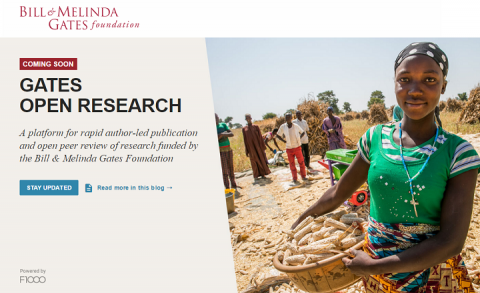AAS Open Research: bringing African research to the global stage
| 15 November, 2017 | Rebecca Lawrence |
|

|
A partnership with the African Academy of Sciences will create a new venue for African researchers to share the results of their work

It’s been a busy three weeks for us here at F1000! We announced that we will be partnering with our first public funder, Ireland’s Health Research Board, and Gates Open Research published its first articles.
We don’t like to do things by halves, so it is with great pleasure that I can let you know that we will be launching another publication platform on behalf of the African Academy of Sciences – AAS Open Research.
In his recent blog post, Trevor Mundel, President of Global Health at the Gates Foundation, suggested that the tide change being brought by those adopting this new way of publishing might be: “the single most important innovation that our organizations are remembered for a century from now.” We of course agree with this statement and that is why we are particularly excited to announce the AAS Open Research, which has the potential to revolutionise how the results of African research are disseminated.
Levelling the playing field
Once a grant proposal has been scrutinized by a funder’s peer reviewers and been selected for funding, or a researcher has been recognised as a leader in their field (such as the AAS Fellows and Affiliates), the researchers should be able to publish all the results they wish to share, regardless of outcome.
Despite all good intentions, evidence suggests that implicit bias in the peer review and editorial selection processes mean that authors from some ethnic, geographic or demographic backgrounds are often at a disadvantage. A disproportionate volume of publications in scientific journals tend to be authored by researchers from a relatively small number of countries.
Enabling these researchers to decide for themselves what results they wish to share and when, will put their research on a level playing field with researchers from other countries around the world.
AAS Open Research will be open to all AAS Fellows and Affiliates as well as all researchers funded by AESA (The Alliance for Accelerating Excellence in Science in Africa). AESA is an initiative of the AAS and the New Partnership for Africa’s Development (NEPAD) Agency, and is an agenda setting and funding platform established to address Africa’s health and development challenges.
Enabling these researchers to decide for themselves what results they wish to share and when, will put their research on a level playing field with researchers from other countries around the world. This will remove the long delays and editorial biases for these research communities who currently find it disproportionately difficult to publish their research.
As with F1000Research and our other publishing platforms, transparent peer review will occur after publication, enabling others to read the reports of independent experts from around the world to help assess the quality of the published work.
AAS Open Research will also enable authors to obtain international recognition and visibility for their work, and will be supported by its own social media presence and blog, which will be run by F1000, to promote articles to a much wider audience.
Creating capacity
From the time that I have spent in Africa speaking with local researchers, I’ve heard a lot about the importance of capacity building within the research community. In many African countries, students need to publish an article in a peer-reviewed venue to be able to graduate and hence move on with their careers.
The publication and peer review speed of AAS Open Research, and the ability to publish a wide range of study types from traditional research articles to null/negative findings, small studies, data notes, software articles, case reports and others should be especially beneficial to early career researchers.
In addition, transparency throughout the publication process facilitates researchers to develop the skills needed to effectively share and discuss their research with the broad scientific community, and to critically assess the work of others. This will support the important work that AJOL, INASP and others provide in training researchers in the many aspects involved in the academic publication process.
An African platform that belongs to Africa
In various discussions that I’ve had with African stakeholders over the past few months, there have been some concerns that this could be perceived as a Global North publisher telling the African research community how to share and publish their work. It is for this reason that I think it is very important to reiterate that we do not see ourselves as a publisher in the normal sense, but rather simply as a service provider to the organisations for whom we run these various publication platforms.
As Prof Nelson Torto, AAS Executive Director, discusses in his blog about AAS Open Research, the AAS have taken the decision to launch their own platform to support transformation of their research into a powerful resource for educating future generations of scientists, solving Africa’s pressing and common challenges.
At the end of the day, the AAS will have full control over the future direction this platform takes. To keep up-to-date on the progress of AAS Open Research and future plans, sign up for updates on the various milestones here.

|




User comments must be in English, comprehensible and relevant to the post under discussion. We reserve the right to remove any comments that we consider to be inappropriate, offensive or otherwise in breach of the User Comment Terms and Conditions. Commenters must not use a comment for personal attacks.
Click here to post comment and indicate that you accept the Commenting Terms and Conditions.